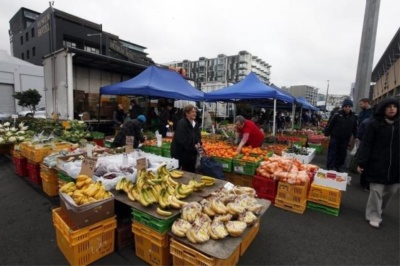New Zealand: Food has become 'a discretionary expense,' says report
A recent report from the New Zealand Christian Council Social Services says that because of housing and other expenses, food has become a luxury expense among poor people in the country.

"Over the past six years our reports show that food has become a discretionary expense, which was reduced to pay high rents, outstanding debt and electricity bills," says the group's Vulnerability Report Issue 22, published on June 15, which used data gathered from 2009 to 2015.
According to the report, there is an increased demand for social services, and the complexity of need has also increased. And while there is a 28 percent decline in applications for "special needs grants for food," there is an increase in foodbank demand.
Trevor McGlinchey, council executive officer, said that families are struggling not only to have enough income to support themselves but also to have housing and food. This, he said, is a "new normal of desperation." He said that in order to meet the needs of these people, the government had relied heavily on community groups.
"However, there has been no increase in funding," he is quoted by Stuff as saying. "In fact it has been eight years since there has been a sustained increase in resources for community-based service providers."
The government, according to Stuff, disputed the numbers on the report.
"Special needs grants for food peaked in 2010 at the height of the Global Financial Crisis, and are now at similar levels to 2011," a spokesman said. "While the number of applications has declined, the percentage of applications granted has increased."
When it comes to housing, the report says that there is a decline in the number of people who were assessed as "needing a state house," but "overcrowding, homelessness, families living in unsafe temporary accommodation (caravans, boarding houses, tents)" has become apparent in some communities. Moreover, with inadequate household income and increased household costs, people are turning "to third tier lenders and credit, creating a spiral of debt and more hardship."
Metiria Turei, co-leader of the Green Party, said that the government's investment approach makes community service providers feel uncertain over the funding. She claimed that the government wants to fund fewer organizations, but even large ones, such as the Salvation Army, report "static funding over a number of years and increasing demand."
"The so-called community investment strategy is simply a disguise for reducing funding to organisations," she said. "Meanwhile, the problem for families is the Government's cutting back on its own social services and restricting community organisations in providing their social services."
The first NZCCSS report in 2009 was made because of the impact of the 2008 Global Financial Crisis on New Zealand communities, but it sees that after six years, the situation has not yet returned to pre-GFC levels.
The New Zealand Christian Council Social Services represents six church networks in the country that are responsible for roughly 500 social service delivery sites. They are: the Anglican Care Network, the Baptist, Catholic and Presbyterian social services agencies, as well as the Methodist and the Salvation Army churches. According to the website, they provide child and family services, services for older people, food bank and emergency services, housing, budgeting, disability, addictions, community development and employment services
 Christians don't have to affirm transgenderism, but they can’t express that view at work: tribunal
Christians don't have to affirm transgenderism, but they can’t express that view at work: tribunal Archaeology discovery: Medieval Christian prayer beads found on Holy Island
Archaeology discovery: Medieval Christian prayer beads found on Holy Island Presbyterian Church in America votes to leave National Association of Evangelicals
Presbyterian Church in America votes to leave National Association of Evangelicals Over 50 killed in 'vile and satanic' attack at Nigerian church on Pentecost Sunday
Over 50 killed in 'vile and satanic' attack at Nigerian church on Pentecost Sunday Ukrainian Orthodox Church severs ties with Moscow over Patriarch Kirill's support for Putin's war
Ukrainian Orthodox Church severs ties with Moscow over Patriarch Kirill's support for Putin's war Islamic State kills 20 Nigerian Christians as revenge for US airstrike
Islamic State kills 20 Nigerian Christians as revenge for US airstrike Man who served 33 years in prison for murder leads inmates to Christ
Man who served 33 years in prison for murder leads inmates to Christ


 Nigerian student beaten to death, body burned over ‘blasphemous’ WhatsApp message
Nigerian student beaten to death, body burned over ‘blasphemous’ WhatsApp message 'A new low': World reacts after Hong Kong arrests 90-year-old Cardinal Joseph Zen
'A new low': World reacts after Hong Kong arrests 90-year-old Cardinal Joseph Zen Iran sentences Christian man to 10 years in prison for hosting house church worship gathering
Iran sentences Christian man to 10 years in prison for hosting house church worship gathering French Guyana: Pastor shot dead, church set on fire after meeting delegation of Evangelicals
French Guyana: Pastor shot dead, church set on fire after meeting delegation of Evangelicals ‘Talking Jesus’ report finds only 6% of UK adults identify as practicing Christians
‘Talking Jesus’ report finds only 6% of UK adults identify as practicing Christians Mission Eurasia ministry center blown up in Ukraine, hundreds of Bibles destroyed: 'God will provide'
Mission Eurasia ministry center blown up in Ukraine, hundreds of Bibles destroyed: 'God will provide' Church holds service for first time after ISIS desecrated it 8 years ago
Church holds service for first time after ISIS desecrated it 8 years ago Burger King apologizes for 'offensive campaign' using Jesus' words at the Last Supper
Burger King apologizes for 'offensive campaign' using Jesus' words at the Last Supper Uganda: Muslims abduct teacher, burn him inside mosque for praying in Christ’s name
Uganda: Muslims abduct teacher, burn him inside mosque for praying in Christ’s name